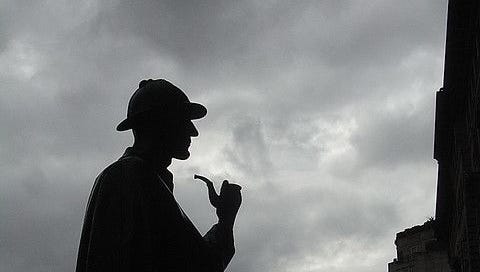Whatever trouble or frustration may come to me, I have only to open a book, listen to a symphony, or run my pen across a blank sheet of paper, and I will be back home, in the place where I belong, a fellow of the virtual college that I have spent a lifetime in creating, communing inwardly with my imagined friends.
Roger Scruton
When anyone asks me why I write, I will have different answers to give them — all of which are true. Primo, that writing is clear thinking; secundo that writing helps me to reflect, organise, and share my thoughts; and tertio, that I want to be like Sherlock Holmes. Off all three which are true and genuine, one is more true and genuine than the others: number three —I want to be like Sherlock Holmes.
I have only ever told the true story of how I found myself writing consistently to a few people who asked. With others, I just get into the first two reasons why I write — which are really just benefits of writing that I discovered after I had started writing. Number three stands truer and more genuine than those two earlier stated benefits because it was what led me here in the first place. I would never have discovered the benefits of writing if I did not want to be like Sherlock Holmes.
It all started when I was an intern at a laboratory. With no task for the day, the interns — four of us if I remember correctly — were either asleep or glued to our phone screens in the laboratory classroom. Whatever we were doing, we were bored to death. I resorted to reading, swiping the pages of The Adventures of Sherlock Holmes. It was not the only book I had read during that period. It was just the most lively one.
Fascinated with the quirky guy in a funny hat and his candid friend and narrator, Dr Watson, I wondered how one fellow could be a repository of hard facts, great pattern recognition, and a limitless faculty for making deductions. Of course, Mr Holmes is a fictional character. But then I could not resist him swiping at Inspector Lestrade with his wit — wit being a scarce refining quality in men of knowledge; any idiot can be intelligent, so says Nassim Taleb. “If wit signals intellect without nerdiness, platitudes signal nerdiness without intellect” — also Nassim Taleb.
As I burrowed into the book, following Holmes and Watson on their cases, and observing their methods, it was becoming clear to me what I wanted to be. A detective. Everyone should be a detective, I must have thought. So I did the next practical thing: download some crime games where I could practice my adeptness at pattern recognition. Fortunately for me, I could not perform worse and be any more awful than I did at those games. Left to solve those murder cases, the wrong people would definitely end up in prison. To save more people from facing miscarriages of justice, I decided to do the honourable thing and retire from an undemanding career in investigating crimes on a mobile phone. But my dream of becoming a detective was not over yet. I just changed departments. I decided to be a detective of ideas; that is, investigate ideas.
Now I would not be the first person who wanted to investigate ideas. Every academic and intellectual worth his salt is that guy. But what drove me was — I believe — different from the academic and the intellectual in that unlike them, I didn’t tell myself that I was seeking the truth as most intellectuals I know will say — which is a platitude to my ears. My motivation was thrill-seeking. I was bored like the pipe-smoking Holmes. I needed ‘fixes.’ I wanted the rush of good and new ideas. It just happened that I want them to be good as well as true. In other words, I am a boredom-evading detective with the misfortune of wanting my evasion of boredom to bear honesty and integrity. Somewhere beneath my thrill-seeking nature laid a noble chest. I mean, it makes sense that I want the ideas to be true as well as enchanting. Just as I stopped investigating crimes because my conscience wept for the potential victims of my incompetent detective work, I had a conscience that did not want to flirt with lies and falsehood. So, I chose the “life of the mind” instead.
In the life of the mind, reading and living—experiencing the world—is how I gather the facts. Writing is how I sort through the facts and make the deductions. Writing and publishing (here and on other platforms) are how I avoid a full-scale retreat from the world and every worthy gaze.
Speaking of the life of the mind — or as in my preferred term, “Living with a mind,” I soon realised something peculiar. That every adult knows that they have a mind. A good majority of these adults use their minds. But only a handful know how to live with a mind (or their minds).
Blaise Pascal was really up to something when he said that “All of humanity’s problems stem from man’s inability to sit quietly in a room alone.” But it is possible that I am simply accepting a ready-made sentiment: it fits too neatly into my proclivity for silent contemplation. I have seen firsthand how choosing and committing to live a life of the mind pits you against those for whom the mind is a mere tool and do not consider it as anything to be lived with. It takes self-control for you to not treat them with disdain.
Once you begin to treat the mind as something like an entity with its own end, you occasionally feel that disgust towards those for whom the mind is simply a jackhammer or a chainsaw — something to be used aggressively to generate ends other than itself such that it is maintained like machinery rather than as an organism with its own life. These people, as you will so perceive, have no respect for the mind; at least not more than they do a screwdriver. They treat it like it were not delicate; like it were not charming; you feel the same anger as you would at someone rough-handling a plump, chubby little baby. This distinction, if your mind grasps it, influences your perception of what makes good literature: books you read to maintain the mind as if it were a delicate organism — books and subjects that foster a magical feeling rather than those used for cranking a machine to efficiency.
But this life of the mind tends towards madness. It also tends towards a morbid introspection. As well as sliding towards a euphoric state; a dreaminess that if it fully blooms, produces an appearance of sedation as you see in stoners and opiate addicts where they stare into space and wow at their fingers. Or more dangerously, that sedated zombie slump which is now common to the opioid-ridden streets of San Francisco.
For all I know, universities were the means to prevent this sedation by engendering discipline and focus in the admitted fellows, providing them with a community with other people living with a mind, while still granting them considerable liberty to nurture their minds without the pressure of being economically productive. I don’t know if universities today maintain this character — I was in one and I knew more than ever that people who live with a mind were scarce.
If you asked my recommendation now that universities have failed in fulfilling this task, I would opt for useful employment, especially doing something with your hands — something physical that limits the use of your mind. But that is one extreme option. The other option is to master the magic of the inner life and embody it until you can produce economically valuable things, as well as guide others in this way of life; without you losing the enchanting feeling within. This is a harder option — one I hope to achieve. It should be worth it.
One lingering problem in this commitment is that it does not appear so when anyone looks at it from the outside. It appears like uselessness; like play; like chasing the wind. I am a thrill-seeker; of course, I will find myself chasing windy things such that I struggled for more than two years to find a fitting description for my blogs and publications—"essays from contemplation, curiosity, and interest. I test things and hold fast to that which is good. This is my way of staying awake in a lulling world."
‘Staying awake’ is a struggle. But it must be done. Some people who live with a mind call themselves flaneurs. I simply call myself an essayist. After all, to essay is “to try.”
Fortunately for me, the life of the mind is not perfect. People sneer at me and lovingly turn their noses up at my (non-)activity in irritation. Someone who inadvertently offered me advice said that I was wasting my time musing. I am grateful for his expertise.
Unfortunately, still, I have found those who inspire me in this path I have chosen. They have done a marvellously wicked job of fanning the flames of my desire to be like Sherlock Holmes. They have fueled my misery by giving me hope. They have fueled my imagination with anecdotes of their successes. I have had glimmers of these successes too in my little time out here. However, I am a lifelong supporter of Arsenal Football Club: it is the hope that kills.
Thank you for reading.
Here is your meme: I am getting the feeling that I saw the wrong Oppenheimer. Still fire though.
I would like to hear from you if you have a thing for the life of the mind. Send a message.





